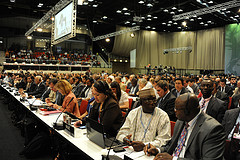15th December 2011 USA
Durban: A cause for optimism
 For those of us actively working toward successful international negotiations on climate change, the most recent meeting in Durban, South Africa seems like cause for optimism this holiday season.
For those of us actively working toward successful international negotiations on climate change, the most recent meeting in Durban, South Africa seems like cause for optimism this holiday season.
The UN climate talks wrapped up last weekend with over 120 countries (including major economies such as the United States) forming a coalition behind the EU’s ambitious proposal of a roadmap to a legally binding global deal to curb emissions. This is an important step – to avoid dangerous climate change, the world needs to limit global temperature rise to below two degrees, and we absolutely will not do that without global cooperation.
Despite this positive step, some have expressed concern that competing priorities in the United States will mean a lack of near-term action on the results of Durban. Economic recovery and presidential campaigns are sure to capture the vast majority of attention and concern for the next year – and probably rightly so. But I am optimistic that in the medium-to-long term, Durban will prove to be a key moment in the global effort to reduce emissions and collectively curb climate change.
And the scientific consensus continues to demand this international agreement. A flurry of recent reports, including a major new scientific assessment by the Met Office Hadley Centre – one of the world’s leading centres for climate change research in the UK – highlights the effects the world could face if dangerous climate change is allowed to progress. The assessment shows that temperature rise caused by unchecked emissions will lead to significant changes in rainfall patterns, increased pressure on crop production, water stress and flood risks in many areas, including in the United States.
The way I like to think about such grim predictions is that they illustrate the impacts we can avoid by taking ambitious international action to bring down emissions. The UK is committed to doing its part. We were first to set our greenhouse gas reduction ambition in law with the 2008 Climate Change Act, putting us on a path to reduce our emissions to 80 percent below 1990 levels by 2050. We’ll continue to make the case for other countries to do so as well, for the sake of our collective wellbeing and prosperity. And while the Durban agreement may not have solved the whole puzzle, I am confident that it was a significant step in the right direction.
we just hope that all countries commit to bring down emissions
and save the world for generations to come.